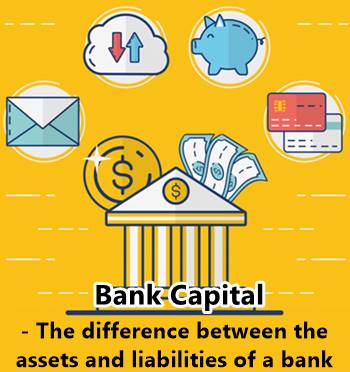Bank Capital
What is Bank Capital?
Bank capital is regarded as the difference between the assets and liabilities of a bank. Furthermore, it also represents the equity value to investors or the net worth of the bank. The asset part of the bank’s capital consists of interest-earning loans, government securities, and cash.

On the other hand, the liabilities section comprises debts and loan-loss reserves.
How does Bank Capital Work?
Basically, bank capital demonstrates the value of the equity instruments of a bank that can cover the losses and concentrate lesser on payments in case the bank liquidates. Although the definition of bank capital is similar, as mentioned above, national authorities work with their own regulatory capital’s definition.
The primary banking regulatory framework covers international standards enacted upon banking supervision through international accords. Such standards offer a precise definition of the regulatory bank capital that banking and market regulators monitor closely.
Considering that the banks serve an essential role in the country’s economy by acquiring savings and using them to provide loans, the banking industry and the bank capital’s definition are extremely regulated.
Although every country can have its own needs and requirements, the international banking regulatory accord offers a complete framework that is useful in defining regulatory bank capital. Bank capital acts as a self-insurance that provides a safeguard against Insolvency as long as it is in a positive condition. With bank capital, even the management acquires an incentive to tackle risks seamlessly.
Book Value of Shareholders' Equity
The bank capital can be regarded as the book value of equities for shareholders on the balance sheet of a bank. Considering that a majority of banks keep revaluing financial assets often than firms and companies, equities of shareholders could serve a rational substitution for bank capitals.
Talk to our investment specialist
General items that get featured in the shareholders’ equity book value comprise accumulated comprehensive income, retained earnings, paid-in capital, common stock, and preferred equity. This book value can easily be calculated as the difference between the assets and liabilities of a bank.
All efforts have been made to ensure the information provided here is accurate. However, no guarantees are made regarding correctness of data. Please verify with scheme information document before making any investment.












